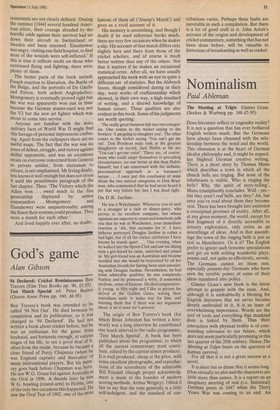God's game
Alan Gibson
94 Declared: Cricket Reminiscences Ben Travers (Elm Tree Books pp. 96, £5.95) Test Match Special ed . Peter Baxter (Queen Anne Press pp. 160, £6.95) Ben Travers's book was intended to be called '94 Not Out'. He died between its completion and its publication, so it was changed to '94 Declared'. He had not written a book about cricket before, but he was an enthusiast for the game from boyhood, and fortunate enough, at various stages of his life, to see a good deal of it: often from the inside, because he became a close friend of Percy Chapman (when he was England captain) and thereafter of many international players. But his memory goes back before Chapman was born. He saw W.G. Grace bat against Australia at the Oval in 1896. A decade later he saw W.G. bowling (round-arm) to Hobbs, one of the only two occasions this happened. He saw the Oval Test of 1902, one of the most famous of them all ('Jessop's Match') and gives us a vivid account of it.
His memory is astonishing, and though I doubt if he used reference books much, there are very few occasions when he makes a slip. His account of that match differs only slightly here and there from those of the cricket scholars, and of course is much better written than any of the others. Not that it matters if he makes an occasional statistical error. After all, we have usually approached his work with an eye to quite a different set of statistics. But the Aldwych farces, though considered daring in their day, were works of craftsmanship which showed, in their own way, a high standard of writing, and a shrewd knowledge of human nature. These qualities are also evident in this book. Some of his judgments are worth quoting:
The really great batsmen fall into two categories. One comes to the wicket saying to the bowlers: 'I am going to slaughter you'. The other comes to the wicket saying 'You can't get me out'. Don Bradman must rank as the greatest slaughterer on record, Jack Hobbs as the ace 'You-can't-get-me-outer'. There are, of course, many who could adapt themselves to prevailing circumstances, no one better at this than Hobbs himself; but I am concerned with the definite, preconceived approach in a batsman's nature . . . I once put this conclusion of mine about the two natural categories to Don Bradman, who commented that he had never heard it. put that way before but that I was dead right.
On D.R. Jardine: He was a Wykehamist. Whenever you sit next to a stranger at a club or dinner-party, who proves to be excellent company, but whose opinions are superior to yours and somebody tells you that he was at Winchester, your immediate reaction is `Ah, that accounts for it'. I have hitherto portrayed Douglas Jardine in rather a bad light, but of all the cricket celebrities I have known he stands apart . . One evening, when he walked into the Sports Club and saw me dining with a girl-friend he came, uninvited and joined us. My girl-friend was an Australian and became terrified that she would be boycotted by all her Australian friends for having been seen associating with Douglas Jardine. Nevertheless, he had some admirable qualities: he was completely fearless and he possessed a witty, if somewhat sardonic, sense of humour. He died comparatively young, at fifty-eight and I like to picture his arrival at the Golden Gates, waving their custodians aside to make way for him, and warning them that if there was any argument about it he'd send for Larwood.
The origin of Ben Travers's book (for which Brian Johnston has written a foreword) was a long interview he contributed one lunch interval to the radio programme, 'Test Match Special'. A book has been published about the programme, to which all the current commentary team contribute, edited by the current senior producer. It is well produced, cheap at the price, with some excellent photographs, and reproductions of the scoresheets of the admirable Bill Frindall (though proper acknowledgment is made to the founder of modern scoring methods, Arthur Wrigley). I think it fair to say that the tone generally is a little self-indulgent, and the standard of con tributions varies. Perhaps these faults are inevitable in such a compilation. But there is a lot of good stuff in it. John Arlott's account of the origins and development of cricket commentary, something that has not been done before, will be valuable to historians of broadcasting as well as cricket.


































 Previous page
Previous page